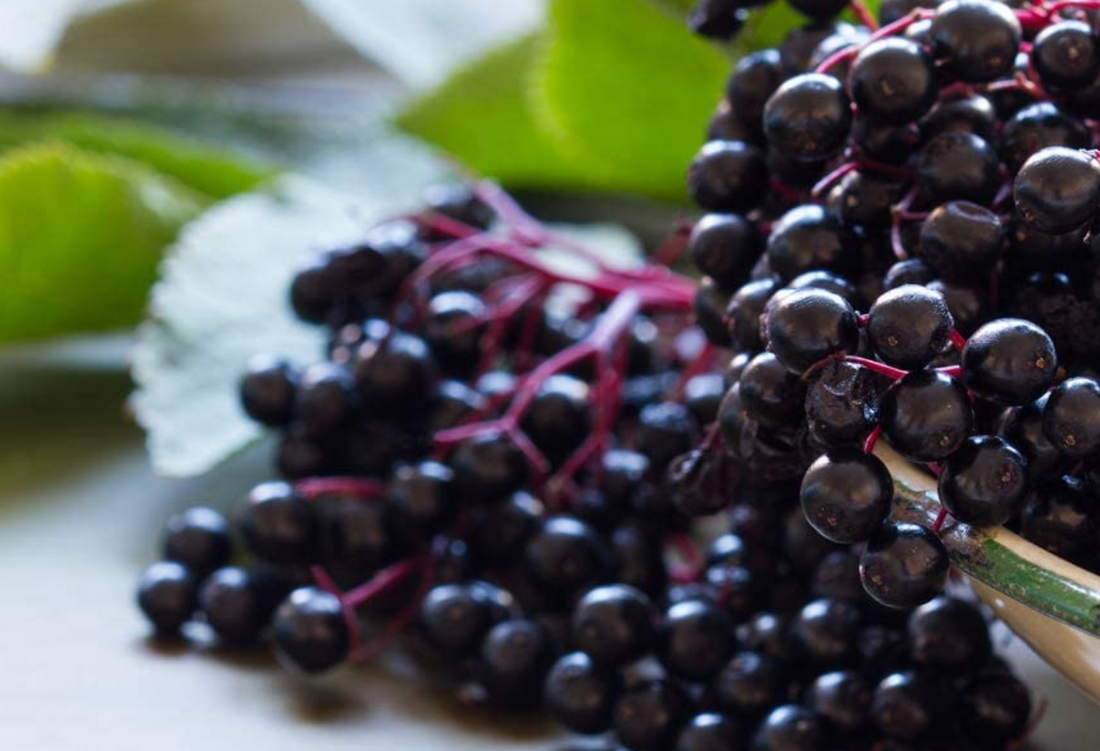
Health Benefits of European Black Elderberry Fruit or Sambucus Nigra
Black elderberry (Sambucus nigra) has a long multicultural history as a botanical remedy, and is now one of the worlds most-used medicinal plants due to it's efficacy and the increasing popularity of botanical supplements. The black elder grows naturally in most of Europe and has been introduced to other continents to make use of the fruit and flowers of the plant. Elderberry fruit has been used for food, as delicious syrup, for making wine, and also as a food coloring and food flavoring. Elderberry is a tried and true health-promoting immune system booster.

Historical Use of Black Elderberry As An Herbal Remedy
The European black elderberry (Sambucus nigra) has been associated with health and healing since at least 400 BC when Hippocrates, the “Father of Medicine,” referred to the elder tree as his “medicine chest.” The dark purple berries of the European elder tree have been therapeutically used for centuries to make natural remedies. Traditional folk healers consider the black elderberry to be one of Mother Nature's most healing plants, and the berries of the European elder are used in traditional German medicine for various complaints.

High in Nutrients and Antioxidants
The elderberry fruit is very nutritious and offers us vitamins, minerals, carbohydrates, proteins, fats, essential oils and flavonoid rich compounds. The polyphenols of elderberry are a potent source of antioxidants.
Health Benefits of European Black Elderberry Fruit
The abundant antioxidants and vitamins in black elderberries may boost the immune system, reduce inflammation, lessen stress, and protect your heart. It has been used for a long time in folk medicine to promote sweating, reduce fever and increase urination.
Modern Scientific Studies
Modern research has shown that black elderberry (Sambucus nigra) may support the immune system, may fight viruses including the common cold and flu, and may reduce inflammation. Supplementation with elderberry has been found to substantially reduce the duration of upper respiratory symptoms. A way to fight infections may be provided by this herbal remedy as it has repeatedly shown favorable effects when used as a treatment for infections that affect how you breathe. Elderberry extract seems to offer an efficient, safe and cost-effective treatment for influenza. Recent scientific studies have shown black elderberries to have antiviral, antibacterial, antimicrobial, antidepressant, anti-tumor and hypoglycemic properties. Elderberry extract is known to activate the healthy immune system by increasing inflammatory cytokine production.
How To Enjoy Black Elderberries
Cooked Elderberries Are Safe In Small Doses
Black elderberry extract is generally recognized as safe by the United States Food and Drug Administration. Most doctors believe it’s safe to have black elderberry in small doses. But unripe or uncooked berries or flowers from the plant can cause nausea, vomiting, and diarrhea. Larger amounts can cause even more serious poisoning.
Other things to keep in mind:
- If you are pregnant or breastfeeding, do not use elderberry.
- Other parts of the elder tree, including the branches, twigs, leaves, roots, and seeds, are toxic. They contain a type of cyanide called glycoside.
- People with immune problems might have reactions to elderberry.
- If you get a rash or have trouble breathing after you ingest elderberry, you might be allergic to it.
- Because it’s a diuretic, be careful when you take it if you’re on medicines that increase urination.
Talk with your doctor if you’re thinking about taking elderberry.
References:
Bioactive properties of Sambucus nigra L. as a functional ingredient for food and pharmaceutical industry https://pubmed.ncbi.nlm.nih.gov/32362939/
Black elderberry (Sambucus nigra) supplementation effectively treats upper respiratory symptoms: A meta-analysis of randomized, controlled clinical trials https://pubmed.ncbi.nlm.nih.gov/30670267/
Elderberry Supplementation Reduces Cold Duration and Symptoms in Air-Travellers: A Randomized, Double-Blind Placebo-Controlled Clinical Trial https://pubmed.ncbi.nlm.nih.gov/27023596/
Inhibitory activity of a standardized elderberry liquid extract against clinically-relevant human respiratory bacterial pathogens and influenza A and B viruses https://pubmed.ncbi.nlm.nih.gov/21352539/
Randomized study of the efficacy and safety of oral elderberry extract in the treatment of influenza A and B virus infections https://pubmed.ncbi.nlm.nih.gov/15080016/
A Review of the Antiviral Properties of Black Elder (Sambucus nigra L.) Products https://pubmed.ncbi.nlm.nih.gov/28198157/
An evidence-based systematic review of elderberry and elderflower (Sambucus nigra) by the Natural Standard Research Collaboration https://pubmed.ncbi.nlm.nih.gov/24409980/
A systematic review on the sambuci fructus effect and efficacy profiles https://pubmed.ncbi.nlm.nih.gov/19548290/
Prevention and Treatment of Influenza, Influenza-Like Illness, and Common Cold by Herbal, Complementary, and Natural Therapies https://pubmed.ncbi.nlm.nih.gov/27055821/
The effect of Sambucol, a black elderberry-based, natural product, on the production of human cytokines: I. Inflammatory cytokines https://pubmed.ncbi.nlm.nih.gov/11399518/
Colds and influenza: a review of diagnosis and conventional, botanical, and nutritional considerations https://pubmed.ncbi.nlm.nih.gov/17397266/



